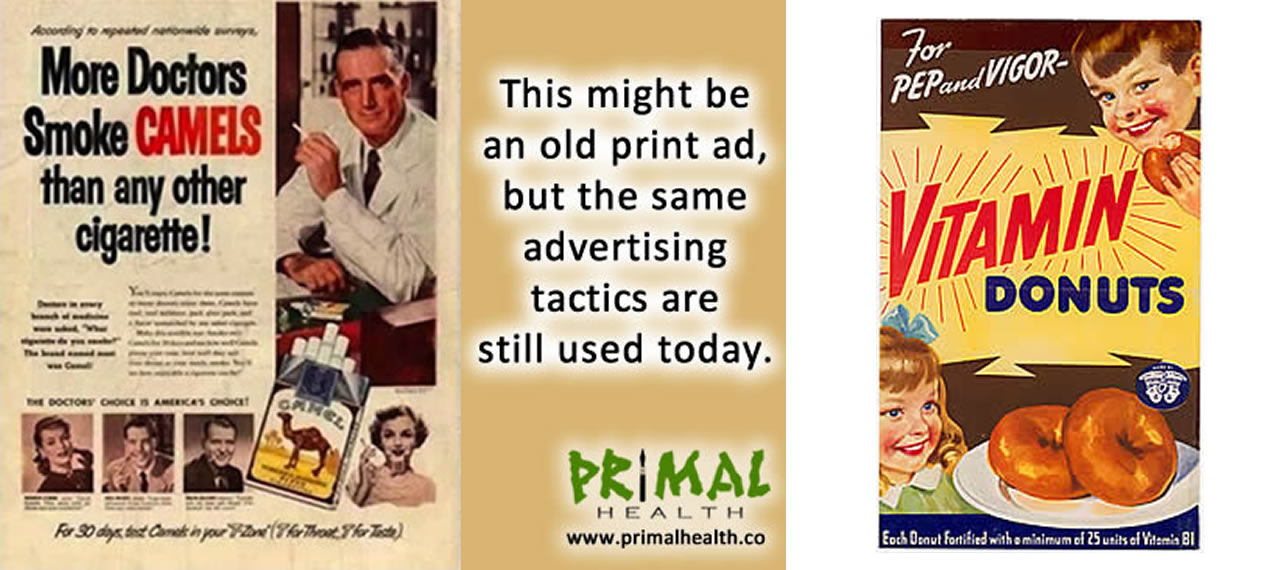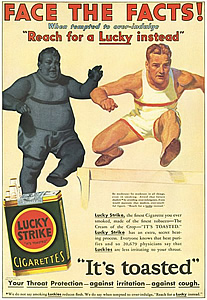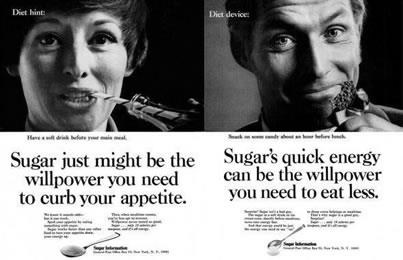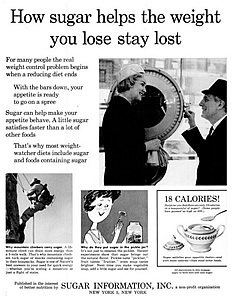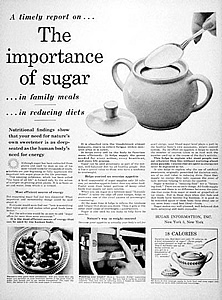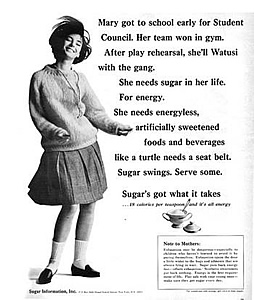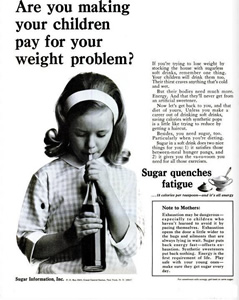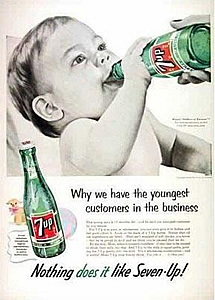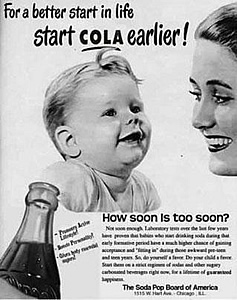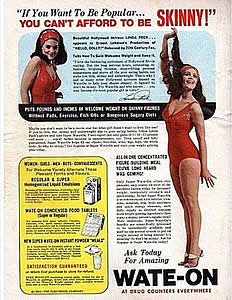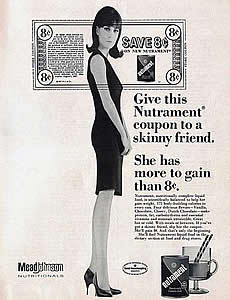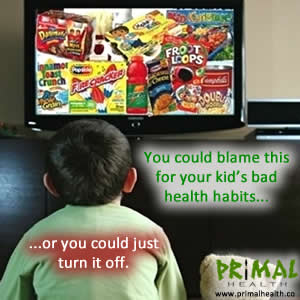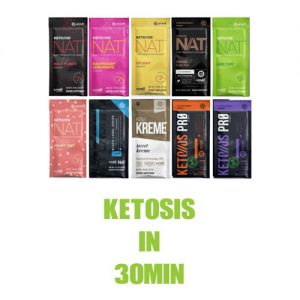We are almost continually surrounded by messages trying to influence us to buy something. Millions of dollars and hours are spent calculating new ways to appeal to our emotions and even trick us into consuming things that we are told will better our lifestyle, image and health.
Older ads carry the highest shock value today because they promote things that we have now realised are highly detrimental to our health and lives.
Cigarettes were promoted by doctors, politicians, celebrities, even Santa Claus. Camel’s were touted as “scientifically proven to show no adverse affects”, and in this ad, Lucky’s is said to be less irritating to your throat.
The Importance of Sugar
Sugar was a massive star in advertisements which emphasized weight loss and energy. The ads are clearly an attempt to win sugar some popularity at a time when diet soft drinks and other diet foods are becoming popular for weight loss. Many of the ads say that real sugar is superior to artifical sugar. Real sugar, they claim, curbs appetite and quenches fatigue. This huge sugar campaign is a perfect example of the many manipulations of advertisements.
“Diet hint: Have soft drink before your main meal.”
“Diet device: Snack on some candy about an hour before lunch.”
Ads disguised as articles
A clever tactic, still widely used today, is to sneakily advertise the product in what looks like an unbiased magazine or newspaper article, as seen in the ad above right entitled, “A timely report on…The importance of sugar.” The “article” continues with, “Nutritional findings show that your need for nature’s own sweetener is as deep-seated as the human body’s need for energy.”
The non-profit guise
All the sugar ads are “Published in the interest of better nutrition by Sugar Information, Inc., a non-profit organisation.” It is not uncommon for food and drug companies to create a non-profit organisation to use as a guise for advertising. Today, we have many “organisations” like the National Heart Foundation and The Cancer Council which “advise” us that if we don’t buy certain products, we will be plagued by disease and death.
Selling to mothers
Many ads appeal to women, especially mothers – society’s main consumer, such as the last sugar ad above on the right, which has a little box saying,
“Note to Mothers: Exhaustion may be dangerous – especially to children who haven’t learned to avoid it by pacing themselves. Exhaustion opens the door a little wider to the bugs and ailments that are always lying in wait. Sugar puts back energy fast – offsets exhaustion. Synthetic sweeteners put back nothing. Energy is the first requirement of life. Play safe with your young ones – make sure they get sugar every day.”
Here are some more examples of scaring mums into buying junk to keep their kids safe and healthy. Notice the cola one is from “The Soda Pop Board of America.”
Processed packaged snacks are heavily advertised as being healthy, not just on TV and in print, but right on the package! Mums are busier and busier these days and are easily conned into buying a ‘quick, healthy snack’ for their kids. Eat healthy by ignoring the health food labels, and by just choosing real plant and animal food instead!
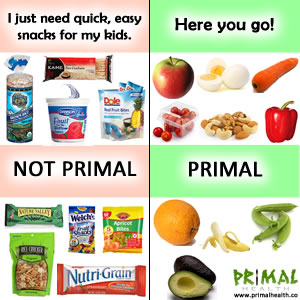
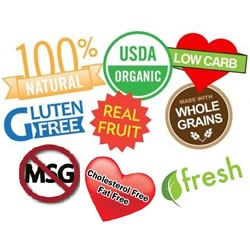
Junk food – now with added vitamins!
Today we have tons of vitamin-enriched processed food lining the supermarket shelves, most commonly nutrient deficient foods like bread, milk and cereal. So even though this Vitamin Donut ad seems hilarious, the tactic is still conning parents today.
“Each donut fortified with a minimum of 25 units of vitamin B1.”
You don’t want to be fat…OR skinny!
The current generations of young to middle age people have been so bombarded with weight-loss advertising, that it’s hard to believe many ads used to sell the opposite – weight gain! These weight-gain drinks and supplements were the answer to being a curvy and popular woman. Curvy was “in” then; skinny is “in” now. It seems no matter what your body looks like, you will never be sexy, popular or good-looking enough if you don’t buy all the right supplements, foods, drinks, clothes, and cars!
“If you want to be popular…you can’t afford to be skinny! Ask today for amazing Wate-On, at drug counters everywhere.”
“Good news for thousands of girls who have no sex appeal. Gain 10-25 lbs. quick, with ironized yeast.”
How to protect your health from advertising
So how do you discern which advertisements are legitimate and avoid consuming harmful products? My solution is to get away from advertisements as much as possible. Only good can come from ditching magazines and free-to-air TV. We don’t watch the news, read the paper or buy magazines and believe it or not, we are still informed, intelligent, social people! The internet allows us to choose and watch TV shows ad-free and read only news stories that are of further interest. Sure, unless you live in the countryside, you won’t be able to avoid advertisements completely, especially with billboards and posters everywhere you turn. However, if you continually educate yourself and stick to primal principles, your intuition will guide you in the right direction.
Proof That Advertising is Bad for Your Health – October 2013

